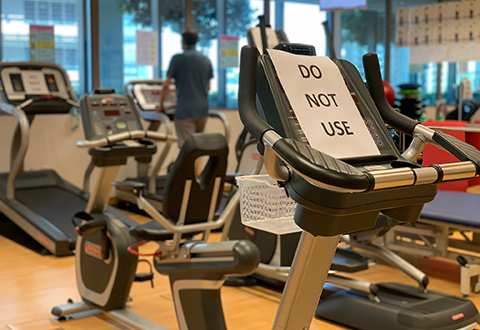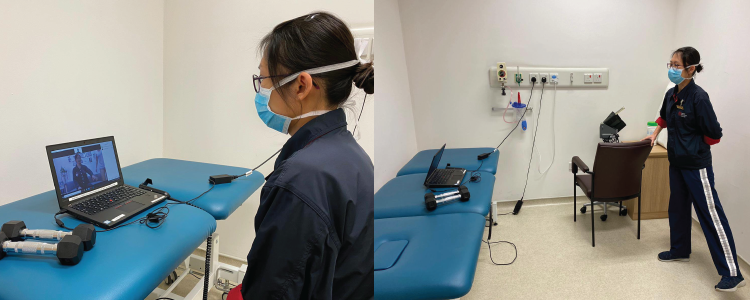The pandemic has given rise to the need for rapid adoption of telehealth services so that our patients can continue to be cared for and be able to gain access to our doctors and our healthcare professionals without stepping into our clinics.
The pandemic has given rise to the need for rapid adoption of telehealth services so that our patients can continue to be cared for and be able to gain access to our doctors and our healthcare professionals without stepping into our clinics.
Take for instance, our physiotherapists at Cardiac Physiotherapy Services have started online sessions for a selected group of patients. Haja Mydin S/O Yah Kathier, Senior Principal Physiotherapist emphasised that virtual consultations are supplementary to centre-based sessions.
Centre-based sessions key in recovery journey
As part of the recovery process for patients who have had cardiac interventions such as surgery or angioplasty, other than regular follow-ups by their doctor, there is a personalised exercise programme to help them get back on their feet.
“What we do is to first assess the patient’s health and fitness level, and then provide an exercise programme that suits their risk and safety profile. From there, we help the patient gradually progress to achieve his goal which could range from walking independently to the coffee shop or going back to work,” shared Haja. A programme comprises 10 sessions and is usually done at the outpatient setting. In between, patients are given a home programme to continue their regime.

Exercise equipment are marked to ensure safe distancing as patients head back for their centre-based appointments at Cardiac Physiotherapy department during this period.
During the circuit breaker period, patients were unable to come back for physiotherapy follow-up as the circuit breaker measures curtailed outpatient visits and consultations. Only critical cases such as those with respiratory conditions or whose caregiver needed training in order to manage the patient at home were seen.
“With the temporarily halt of centre-based appointments, patients might not get to ask questions or get adequate information on self-care management. Some didn’t know how to move on with their home exercise programme which is critical to help them get back to their normal activities.”
Caring remotely, beyond the pandemic
To address some of these pertinent issues, the department launched video consultations in mid-May for a group of selected patients. Each session lasts 30 minutes, which is half the duration of a centre-based appointment. Haja shared, “The 30-minute face time allows the patients to clear their doubts and makes them feel more reassuring when they can see us. We will also demonstrate exercises that they can do at home to help them progress in their programme, when time permits.”

Senior Physiotherapist, Samantha Ng meeting her patient over a video consult and demonstrating exercises for him to follow.
Haja highlighted that prior to offering video consultation to patients, there are various consideration factors such as the patient’s risk and safety profiles and whether they are tech-savvy and comfortable to be cared for remotely. While the number of patients they could offer the service to was small, the feedback has been encouraging
“Patients shared that virtual sessions helped save travelling time and cost, and some opined that they felt safer as they do not need to leave their home and be exposed unnecessarily.”
The pandemic has indeed ignited the need for virtual consultations but it is not surprising to see that the concept of telehealth is becoming a new normal for all good reasons. “Even before the pandemic, patients’ common reasons for defaulting appointments include unable to take off from work, no caregiver to accompany them for their appointments, or the misconception that exercising is not an important part of their recovery,” said Sng E-Lynn who manages the department.
“We hope that video consultations could supplement our centre-based care; to provide an alternative for patients who are unable to make a physical visit, and share feedback on their exercise progress and challenges.”
As part of the home exercise programme for cardiac patients during this period, Cardiac Physiotherapy Services has developed additional exercise videos which can be done safely at home, and are also suitable for seniors and aging adults. View them on SingHealth Youtube here.
